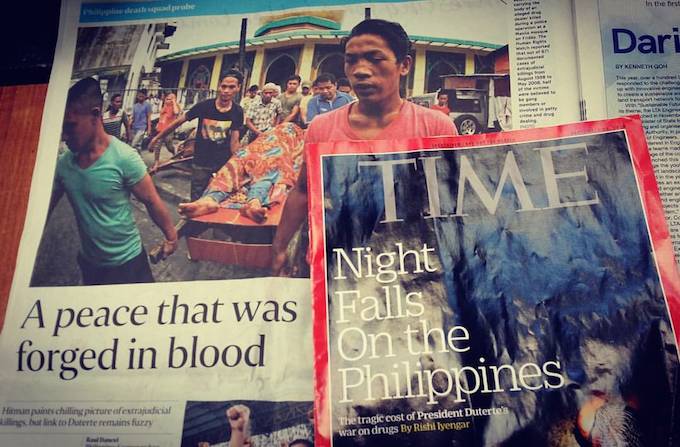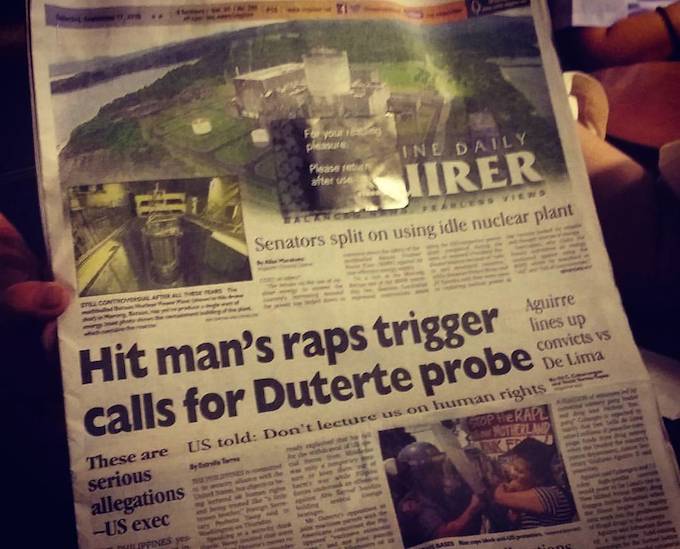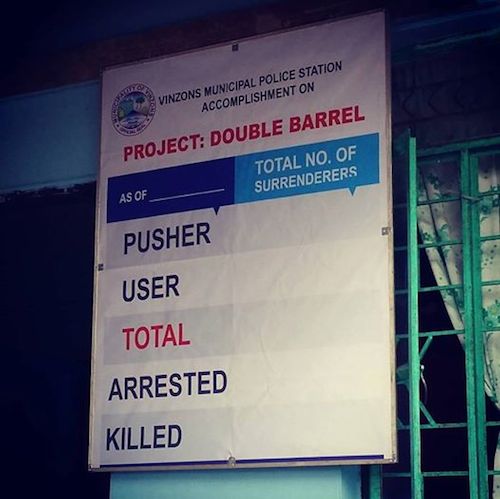Inside the Philippines “war on drugs” – Al Jazeera’s The Stream programme.
By David Robie in Manila
Mounting calls for the Philippines president to be investigated over the allegations of human rights violations deepened over the weekend with revelations by a confessed hit man that at least 1000 extrajudicial killings had been ordered when the president was mayor of the southern city of Davao.
Fresh reports featuring the allegations were included in a cover story in the latest Time magazine, the Singapore Sunday Times and a new inquiry by the Philippine Center for Investigative Journalism into the so-called “Davao Death Squad”.

It is only 80 days since President Rodrigo Duterte was sworn into office, and the PCIJ reports that he now “commands an armed contingent that is a hundred times bigger than it was in Davao, and his ‘enemy’ a thousand times more numerous”.
More than 3000 people have reportedly been killed so far in the so-called Project Tokhang – or “Double barrel” – war on drugs. The president has also called for a six-month extension on his policy, claiming that the drugs business is largely “operated by people in government”.
Time magazine branded its report the “killing season” in the Philippines with a subheading of “Inside President Rodrigo Duterte’s war on drugs”.
The Sunday Times correspondent in Manila, Raul Dancel, reported on some of the victims of the Davao killings, including a 62-year-old mother who lost four of her sons to the assassins.
‘Forged in blood’
The report was headlined “A peace that was forged in blood”.
Self-confessed hit man Edgar Matobato, now 57, told a Philippines Senate inquiry last week that he and other members of the so-called Davao Death Squad had killed some 1000 people in Davao City on the island of Mindanao on the orders of Duterte between 1998 and 2013.
Duterte was mayor of Davao for two decades and now his daughter Sara is the mayor there.
The PCIJ reported in its inquiry that Duterte’s deputies have denied Matobato’s allegations, with Justice Secretary Vitaliano Aguirre II branding these claims as “old lies”. However, the president himself has not responded so far although he has made no secret in the past about his links with the death squads while denying direct responsibility.
The president’s chief legal counsel, Salvador Panelo, reportedly said he saw no reason for the President to respond to a “perjured witness”, adding that the Senate session was “not a hearing on extrajudicial killing, it was a case of extrajudicial lying”.
He said: “No amount of black propaganda, no amount of sinister ploy or plan will stop the President from his relentless campaign against the drug menace and terrorism.”
In one television programme during the presidential election campaign, Duterte declared: “I am the death squad? True. That’s true.” But he later shrugged this off as merely “teasing”.
Davao killings
As PCIJ says, “there is no denying that Duterte’s reign in Davao City had been marked by numerous extrajudicial killings, with Davao media attributing at least 150 deaths there from 1995 to 2001 alone to the DDS [Davao Death Squad] and then Mayor Duterte’s war against drugs”.
According to PCIJ’s research via police and judicial records, the president’s “expanded war” has resulted in a death toll that is “10 times higher within a much shorter period; an average of 38 persons killed a day, or over 3200 in the last 80 days”.

Matobato’s testimony before the Senate inquiry named Senator Leila de Lima as being on the target list while she had been chair of the Philippines’ Commission on Human Rights. (De Lima herself is also at the centre of allegations in a separate Congress inquiry opening this week).
Matobato said he and others in the death squad had been waiting to ambush De Lima in 2009 but she had not ventured into the undisclosed hilly area to inspect a suspected mass grave site where they planned to open fire.
The former hit man alleged before the Senate inquiry that he and others in the liquidation squad took orders from Duterte and killed about 1000 suspected criminals and opponents of the mayor and the Duterte.
Matobato admitted that he had personally carried out at least 50 of the abductions and killings, including an attack on a suspected kidnapper who was hogtied and fed alive to a crocodile.
“Our job was to kill criminals like drug pushers, rapists, snatchers. That’s what we did. We killed people almost every day,” Matobato said.
Journalist assassinated
In one of the most serious claims, the former hit man also alleged that Duterte had had Davao broadcast journalist Jun Pala, a vocal critic of the president when he was Davao mayor, killed.
Responding to the testimony, one of the most influential national dailies, Philippine Daily Inquirer, declared in an editorial that the serious allegations ought to be thoroughly investigated but with “caution and scepticism”.
Until then, noted the newspaper, the president enjoyed the presumption of innocence, “as he must”.
“But herein lies the eternal paradox of our times: the demand for fairness and due process is quickly made when it applies to the powers that be; there is no question, of course, that they deserve it,” said the editorial.
“Those killed so far in the war on drugs – the padyak drivers, the petty pushers in fraying flip-flops, the denizens of dark alleys yelling surrender – did not have the luxury of being afforded the same.
“And here Philippine society is today, in an ever-deepening rabbit hole of national cognitive dissonance.”
The PCIJ has revealed that Duterte has not signed, and the Office of the President has not released, any executive order to define his role and accountability for the war on drugs
‘I will protect you’
But the President has publicly declared to policemen that they are acting under his presidential protection: “I will protect you. I will not allow one policeman or one military to go to jail.”

town of Vizons, Camarines Norte. Such a quiet town apparently has no statistics.
Image: David Robie/PMC
According to the PCIJ, as at September 18 the latest national Philippine police report cited:
- Killed in police operations – 1140
- Killings by unidentified gunmen “under investigation” – 1391
- Drug pusher suspects arrested – 17,428
- “Surrendered” – 714,803 (661,737 alleged drug users and 53,066 alleged drug pushers)
- Houses “visited” – 1,041,429
The PCIJ said: “Whichever is the correct PNP count, these numbers best the casualty tally during the 14 years of martial law under the late strongman Ferdinand Marcos; from 1972 to January 1981, Amnesty International had recorded a total of 3240 persons killed, 34,000 tortured, and 70,000 imprisoned in the Philippines.”
Human Rights Watch and other groups have called for a full United Nations inquiry into the Philippines extrajudicial killings following the detailed testimony from former hit man Matobato.
But calls within the Philippines for impeachment by the powerful Liberal Party were dealt a blow when Vice-President Leni Robredo (who belongs to the party) declared that she hoped no impeachment process would take place, adding it was destined to fail through lack of numbers in Congress.
Despite political differences, she said, it was the duty of every citizen to support the elected President.
Pacific Media Centre director Professor David Robie is in the Philippines on sabbatical.










































You guys pay to much weight on foreign news. We never respect our media in the because we know they are bias and does not always report the truth. We never care about our media report because we know our media are not after reporting the truth but rather whatever agenda they support.
Why do you guys cares about Times report when we don’t believe our media ?
True! People of the Philippines feel safer now. We support the Pres. Duterte’s campaign on illegal drugs. So better go into the grounds and interview the ordinary people than to believe what’s been said by Philippine Media.
Comments are closed.